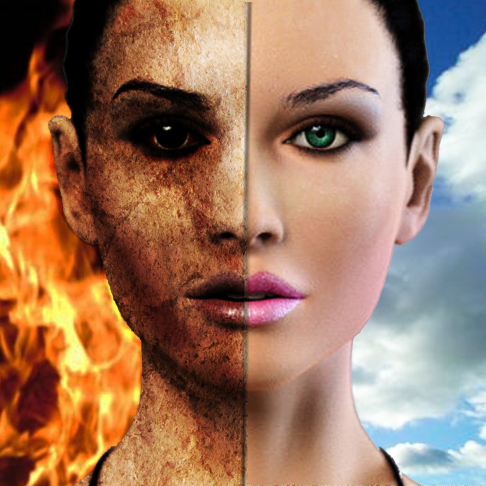ed note–several nuggets upon which to ponder in this one…
First of all, what is (or at least should be) the obvious–
Our unesteemed Hebraic author is correct–there is NO compatibility between the religion of the Jews and the religion of Jesus, a fact made Kristol clear to anyone who bothers to read just the 4 Gospels. The notion that Christianity has any affinity whatsoever with Judah-ism is like saying that because sheep and wolves are both covered with hair and run on 4 legs that somehow these 2 factoids make them similar as well.
And for that reason, we have to at least give her the credit due for being honest in her discovering that ‘no man can serve 2 masters, in that he will either love the one and hate the other or hate the one and love the other’ just as Jesus stated, a fact which unfortunately far too few Christians understand and take to heart when it comes to the adulterous love affair they maintain both with Jewry and with the abominable Judah-ism which is their credo.
Next is the equally obvious–which is imagining the uproar that would occur if our unesteemed Hebraic author–rather than falling into her Jewish upbringing chose instead her Christian one, had written a piece with a title such as ‘H’Nooka was my favorite holiday — until I got too Christian’ and the Apocalyptic screeching campaign that would take place.
Mira Fox for the Jewish Daily Forward
When I was a child, Christmas was my favorite holiday. My dad isn’t Jewish, but that’s not even why we celebrated Christmas; my Jewish mom grew up celebrating too. Her mother had been jealous of how much fun it seemed, so she insisted on having trees and stockings and carols. When I was growing up, Christmas was a big deal — the biggest celebration in our household, the holiday everyone returned for.
But by my mid-20s, the magic wore off. My last two Christmases at home were dominated, respectively, by huge family drama set off by a cat (I assure you it was dumb as it sounds) and a kidney infection that sent me to the ER. I took it as a sign and skipped the most recent few years. It felt like a betrayal — but it was also a relief.
The truth was that I’d begun to feel uncomfortable celebrating Christmas. Not just because of the family drama or the dynamics of gift-giving, but because of my increasingly strong Jewish identity and practice.
I had always identified as Jewish, but my upbringing was hostile to organized religion. This hostility may have contributed to my fascination with religion, which I majored in during college, but even then, I didn’t focus on Judaism. My identity was based on food and jokes.
But at age 25, I embarked on a plan of bumming around the world as I applied to graduate school, and found myself, accidentally, studying Jewish texts in a religious institute in Jerusalem.
I had just been trying to find some classes — secular classes — to get a head start on grad school and some people in a rock-climbing gym recommended I check out their program.
It was obvious when I walked in that this was not a secular institution. It wasn’t entirely traditional ‘Jewish’— people wore shorts, opposed settlements and were openly queer. But at lunch, they all went to pray. A teacher offered to re-circumcise those who had not had a proper bris. Hallway debates revolved around women wearing tzitzit. I felt out of place.
I wasn’t looking to become religious. But all my new friends socialized via Shabbat meals so I began to learn the prayers and songs to avoid having to awkwardly mumble-hum my way through gatherings. And as the rituals became familiar, I began to enjoy them. When I returned to the U.S. for grad school, I continued, and felt increasingly comfortable in the Jewish community.
But not fully. My family’s blithe celebration of Christmas felt like a dirty secret, especially compared to how little attention we paid to most Jewish holidays. So I created an easy way out by returning to Israel each winter break. When else would I have the time to visit my friends? I expected pushback, but there wasn’t any.
As I have gained increased fluency in Judaism, however, I have felt less need to justify my choices. I don’t do Shabbat every week, but I prefer Modern Orthodox services to Reform when I do — and I might go dancing after. They continue to let me into the synagogue.
I still have a resistance to Christmas and the way the holiday is pushed on you in the U.S. It is part of a Christian hegemony that I deeply resented even before my Jewish Renaissance. Plus there’s the ravenous capitalism and consumerism it creates. But I no longer feel that I lose some sort of Jewish legitimacy by accepting my family’s traditions; the only thing I might lose is a chance for family connection. If there is space for my other contradictions, why not this one?
So, even though there’s a very convenient excuse to skip Christmas again this year, I’m making my return. After quarantining and several negative tests, I will drive down to D.C., decorate the tree, sing carols, and exchange gifts. There’s no guarantee there won’t be family drama or even another kidney infection. But it’s been a hard year, we need to find connection where we can. And my family finds it around a Christmas tree.
